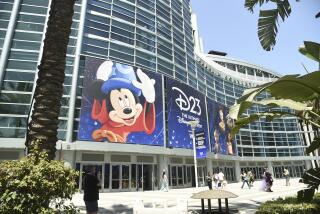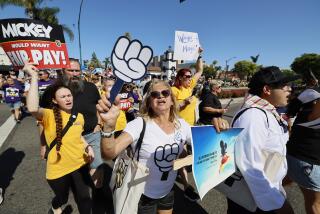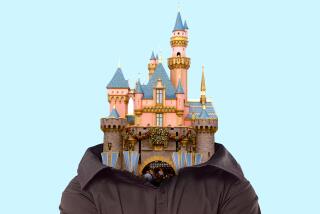Security is major theme at amusement parks
ANAHEIM, Calif. — It’s an odd site: attendants at Disneyland politely asking visitors to have their bags searched as they stream into the world’s most famous theme park.
But like most visitors outside Disneyland on Wednesday morning, Arthur Adams had no objection to showing the fruit and camera inside his backpack.
“In view of the circumstances, it’s quite understandable,” said Adams, 68, of Melbourne, Australia. “It’s for our own protection. The world has changed.” So it has, even in the seemingly most innocuous places, as Americans are discovering a week after the worst terrorist attack in U.S. history.
A trip to a theme park, big league baseball game, arena concert -- even the shopping mall -- may never be quite the same after the Sept. 11 attacks on the World Trade Center and the Pentagon. Throughout the entertainment and retail industry, executives are adopting and weighing a range of security measures -- from handbag checks to surveillance cameras -- more typical of airports than venues of family fun and leisure.
At the Hollywood Bowl, for example, security guards now are inspecting all bags and coolers belonging to concertgoers, a measure that will continue through the end of the year.
“We’ve stepped up our checks and advised staff to watch for things,” operations director Ed Tom said. “Whenever you have a public assembly, one has to be extremely concerned. You just can’t take anything for granted.”
Security was noticeably tighter during the Madonna concerts at Staples Center last week and at Tuesday night’s Los Angeles Kings hockey game. Security personnel searched purses, backpacks and bags and used airport-style hand-held metal detectors on everyone -- including employees -- who entered the arena.
Such precautions will remain in effect indefinitely, a Staples Center spokesman said.
At the American Airlines Center in Dallas, officials have banned curbside parking, added more uniformed and plainclothes security workers and are inspecting bags.
“It’s typical of what’s happening around the country,” said Dave Brown, the center’s vice president and general manager. “Guests need to feel a sense of security.”
Similar steps are occurring nationwide, said Julie Herrick, spokeswoman for the International Association of Assembly Managers in Coppell, Texas.
“I think a major shift will occur in everyone’s approach to security,” Herrick said. “Our member facilities have a big role in crisis management and security when you’re dealing with this many people.”
Security will be particularly tight in the Los Angeles area this weekend as major stadium events are held at two facilities.
Aircraft travel will be limited near Dodger Stadium and the Rose Bowl on Saturday, when more than 120,000 fans are expected to attend sporting events.
The FAA ban includes such aircraft as blimps and small planes toting advertising banners and will remain in effect near major sporting events nationwide until further notice, said FAA spokesman Frasier Jones. Planes within three miles of the venues must be at an altitude of at least 3,000 feet, Jones said.
At the Rose Bowl, football fans are being urged to arrive early and be patient with stepped-up security measures. A crowd of more than 80,000 is expected as UCLA takes on Ohio State at 12:30 p.m.
Pasadena Police Cmdr. Mary Schander declined to discuss security measures in detail, including how many additional private security guards and law enforcement officers will be on hand.
Ticket holders should expect “very thorough” searches of purses and bags being brought into the Rose Bowl, Schander said. “Backpacks and large bags will not be allowed. The use of metal detectors or hand-held security wands has not been ruled out,” she said.
Parking will be strictly monitored, and anyone parked illegally or in a restricted area will be towed immediately.
Just a few miles away, the Dodgers will be fighting for a wild-card spot in the National League West race as they play the first-place Arizona Diamondbacks at 1 p.m. More than 40,000 spectators are expected.
Security will be heightened there as well, and many of the same restrictions apply, such as a ban on large bags and backpacks. Other bags will be subject to mandatory searches. A bomb-sniffing dog will go through the park before the gates open, and LAPD officers will patrol the outside of the stadium.
“Most people are understanding of why we are doing it and the need for it,” Dodger Stadium spokesman John Olguin said.
Disneyland spokesman Ray Gomez said, “The Gulf War is the last time that security measures of this type were in place. We are searching all bags that our guests are carrying as they come into the parks. We have extra patrols and presence resort-wide by both Disneyland security and Anaheim police in uniform and plainclothes.”
But park visitors aren’t the only ones who will notice the changes.
Employee purses and bags also are being searched, and security officers are checking identification. Delivery vehicles are being inspected and verified before they are allowed access.
Disneyland probably will expand its use of video cameras and will more closely scrutinize hiring, said Bob Penfield, a former construction project manager at Disneyland and a 42-year veteran of the company.
Disney World in Orlando, Fla., has taken similar precautions.
The risk is real. During the 1991 Gulf War, the then-director of Florida’s Division of Emergency Management identified Walt Disney World -- along with Florida airports, power plants, the state Capitol and what was then called Tampa Stadium -- as potential targets for terrorists.
The potential risk was underscored Sept. 11 when Disneyland closed in the first non-weather-related shutdown since the assassination of President Kennedy in 1963. Many other theme parks nationwide also closed.
But additional security measures can pose a dilemma for Walt Disney Co. and other theme park operators.
“Theme parks have to be real sensitive about their atmosphere,” Orlando theme park consultant Bill Coan said. “There’s hardly anywhere today where we aren’t watched by cameras -- banks and malls, for instance. And the parks don’t want to be like that.”
Shopping malls also have been affected by the wave of tightened security. Prompted by local law enforcement agencies, some malls closed Sept. 11 and did not reopen until the next day, said Malachy Kavanagh, spokesman for the International Council of Shopping Centers.
Many malls responded by increasing the number of uniformed security officers on patrol. “It’s good business for them to provide a safe environment,” he said.
The Mall of America in Bloomington, Minn., has added more than 20 new security procedures in the last week, said mall spokeswoman Maureen Cahill. She would not discuss them in detail, citing security concerns. But she said more than 140 surveillance cameras and 120 security personnel already are in place.
“Security is always our No. 1 priority, and it has been since we’ve opened,” Cahill said.
Robert Johnson of the Orlando Sentinel and Los Angeles Times staff writers Kimi Yoshino, Rob Fernas and Pat McGreevy contributed to this report.
More to Read
Sign up for Essential California
The most important California stories and recommendations in your inbox every morning.
You may occasionally receive promotional content from the Los Angeles Times.











